11 Best Artificial Intelligence Courses for 2025
I’ve put together a list of the best AI courses available online. Learn about AI and its promises for the future!
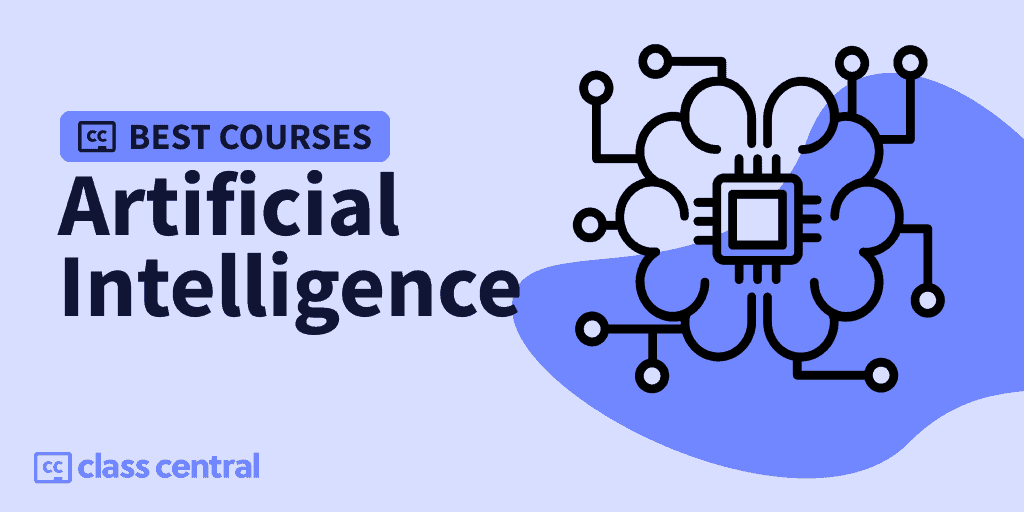
Artificial Intelligence (AI) is one of the most transformative technologies of the 21st century. Its applications range from self-driving cars to personal assistants, and its impact on industries like healthcare, finance, and entertainment is immeasurable.
It is also one of the most controversial and muddied topics on the Internet. Just ask one question on Twitter about the state of AI and you’ll get back 10 different answers, ranging from “AI will fix everything” to “Hide the children, the Roombas are coming!”.

Oh… you didn’t click on this article to hear me rant about the amount of AI proselytizing and AI doom on the Internet? (which I can control, by like, not looking at my feed)? Well then, I’ll skip right to the point: AI is an extremely important topic to be informed about.
Whether you’re the average person leveraging AI for school or work, a hobbyist writing the 1000th article on how AI multiplied their productivity / creativity ten-fold, or an aspiring programmer-researcher hoping to become the next Yann LeCun someday, I promise you that there’ll be at least be one course in this guide that’ll interest you. And here’s the best part: all of the courses are free or free-to-audit, and some of them even have free certification!
Some of the courses listed here will help you understand what AI is and its consequences for the human race. Others go a step further, offering hands-on experience in coding your own AI algorithms. Then, for those who are eager to dive into the complex and intellectually stimulating realm of mathematics and computer science, there are select courses that immerse you knee-deep in the intricate algorithms and theories that form the backbone of AI.
Thus in this Best Courses Guide (BCG), I’ve selected these 10 free courses to help you navigate the fascinating and sometimes downright absurd world of Artificial Intelligence in 2023.
Click on the shortcuts for more details:
- Top Picks
- What is Artificial Intelligence?
- Why You Should Trust Us
- Courses Overview
- How We Made Our Picks and Tested Them
Here are our top picks
Click to skip to the course details:
What is Artificial Intelligence?
Artificial Intelligence refers to the simulation of human intelligence in machines that are programmed to learn from experiences, adapt to new observations, and make decisions just like a human would. AI can understand drawn images, perceive its environment, solve complex problems, and even exhibit creativity in some instances.
Though of course, let’s not forget that AI doesn’t only apply to very intelligent models like ChatGPT or StableDiffusion. The term Artificial Intelligence is very broad, and can also refer to classifying things based on their characteristics (is this animal a cat or a dog?), or predicting the unknown based on known data (how much can I expect if I sell this house now in this neighborhood?). Thus, AI is an incredibly progress-driven field with a wide area of applications ranging from medical to marketing to virtual reality and much more.
What’s the difference between Artificial Intelligence, Machine Learning, and Deep Learning?
AI is an extremely broad field that includes several approaches and techniques, and two of the most essential subfields of AI are Machine Learning (ML) and Deep Learning (DL). To put it simply: ML is a subset of AI that involves the use of algorithms to parse data, learn from it, and make predictions or decisions, while DL is a further subset of ML and involves artificial neural networks with three or more layers to simulate a human brain.
Why Learn Artificial Intelligence?
As businesses and governments invest in AI technologies, the demand for AI professionals is increasing exponentially. According to LinkedIn Talent Solutions, demand is high for tech professionals with artificial intelligence experience. And if you look at the World Economic Forum’s Future of Jobs Report, it is peppered with references to Artificial Intelligence, denoting its importance to the jobs of tomorrow. And of course, if you’re easily swayed by financial incentives (and who isn’t?), consider this: the average salary of a Machine Learning Engineer in the United States is a substantial USD 165K, according to Glassdoor.
And even if you aren’t planning to make AI a profession, there’s still a lot of reasons why you should try to understand it anyways, on a non-technical level of course. You’ve probably heard the debate and controversy over AI-generated content such as AI art copyright laws or ChatGPT plagiarism in schools. 2023 sure was a monumental event in the history of AI, never has AI been so accessible to the average person. Which is probably why even if you are that said average person, you should also try to inform yourself more on AI to the extent that you are able to articulate your opinions on AI without stumbling over your own feet.
Why You Should Trust Us
Class Central, a Tripadvisor for online education, has helped 80 million learners find their next course. We’ve been combing through online education for more than a decade to aggregate a catalog of 250,000 online courses and 250,000 reviews written by our users. And we’re online learners ourselves: combined, the Class Central team has completed over 400 online courses, including online degrees.
Courses Overview
- The most popular course in this guide has around 1M enrollments
- All of the courses in this BCG are free, free-to-audit, or have free certification
- Three of the courses here require no knowledge of programming, while the rest require programming experience
- More than 320K people are following Artificial Intelligence Courses on Class Central.
Best Math/Programming-Free Introduction for Non-Experts with Free Certificate (University of Helsinki)
“What is artificial intelligence? How does it affect your work and life? How will artificial intelligence develop?” Do you want these questions answered without the garbling of AI evangelists / doomers and without mathematical mumbo jumbo?
Helsinki’s free Introduction to AI course aims to make AI more understandable for the AI uninitiated. Thus, virtually anyone can start their AI-learning journey here. That’s not to say that what you’ll learn in this course will be trivial, though. You’ll not only be able to define what AI is and how they can think through and solve problems, but also have a firm mathematical intuition behind machine learning and neural networks, as well as be informed enough to participate in conversations around the philosophy and ethics of artificial intelligence.
And how will the course accomplish such a feat? Through illustrative examples, beautiful diagrams, interactive engaging exercises, MCQ questions, and accessible but informative prose, of course! I mean look at how beautiful the course chapters page looks.
Even if you do know some programming and aren’t afraid of math, I’d still recommend that you take this course regardless. Why? Because this course has a free certificate of completion, and also because this introduction leads up to the next more practical and hands-on course, Building AI (which you can read about in the next listing).
| Institution | University of Helsinki |
| Level | Beginner |
| Workload | 16–24 hours |
| Exercises | Yes |
| Enrollments | 1M |
| Class Central rating | 4.8 (810) |
| Cost | Free |
| Exercises | Available |
| Certificate | Free |
Best Practical Introduction for Programmers of All Levels (University of Helsinki)
The second and last part of the Elements of AI series, Building AI extends on what you’ve learned by teaching you the algorithms involved in creating AI methods from scratch. That means no TensorFlow, no Keras, no PyTorch. Just pure Python!
What makes this course so unique from the others, though, is that it has three difficulties: beginner if you have no coding experience, intermediate if you know Python, and advanced if you’re a Pythonista .
All levels will view the same course content, the only differences are the exercises. For example, Exercise 1: Listing pineapple routes is a multiple-choice question for beginners, but for intermediate and advanced learners it is a coding exercise.
And from that example it should be clear that a beginner won’t finish the course with the same technical knowledge as an intermediate or advanced learner. Thus, I highly recommend that you learn some Python before enrolling.
Assuming that you’ve followed my advice, after completing the course, you’ll be able to:
- describe different types of AI such as optimization, reasoning, and learning
- choose a suitable AI approach to solve simple tasks such as route planning, probabilistic inference, and pattern recognition
- implement a straightforward brute-force optimization algorithm
- implement simple probabilistic inference based on statistical data using the Bayes rule
- build linear regression models from data, and use the models to predict variables of interest, such as apartment prices
- use the nearest neighbor method to predict variables of interest
- use cross-validation to avoid under- and overfitting
- build and apply logistic regression and simple neural network models for prediction
Oh, and the final (optional) task of the course will ask you to propose your own AI idea — what kind of problem you’d like AI to solve, and how?
| Institution | University of Helsinki |
| Level | All Levels |
| Workload | 50 hours |
| Enrollments | 1M |
| Class Central rating | 4.4 (14) |
| Cost | Free |
| Exercises | Yes |
| Certificate | Paid |
Best AI for Business with ChatGPT & Copilot with Live Sessions and Mentoring (Noble Desktop)
If you prefer instructor-led learning, Noble Desktop’s AI for Business with ChatGPT & Copilot offers real-time feedback and accountability that pre-recorded courses can’t match.
What I find interesting is that this program runs both in-person (NYC campus) and online (Zoom). Even if you’re attending online, you’ll have individual attention and can see other students in the classroom. You’ll be able to interact with instructors, receive feedback, and ask questions during sessions. Plus, you’ll get access to class recordings and workbooks – pretty helpful for catching up if you miss a class or reviewing what you learned.
Key Benefits
- Small class sizes (8-15 students)
- Certificate of completion to showcase achievements
- Free retake within one year
- Detailed class files with real-world projects
- Can also upgrade to the “MBA Business Certificate” for additional training
Noble Desktop knows what they’re doing – they’ve been around for over three decades providing instruction with industry experts. So you can rest assured your mentorship will not be with someone who just finished the course. Don’t take my word for it – student reviews on Yelp and Google praise their practical approach and instructor quality.
What You’ll Learn
- Generative AI and ChatGPT to understand its potential and how it can be leveraged for tasks
- Write prompts that provide context-specific responses from ChatGPT
- Real-world applications of ChatGPT to solve problems in different fields.
- Expand capabilities by using Microsoft Copilot to save time across Office 365 apps like Excel, Word, PowerPoint, Outlook, Teams, and OneDrive
- Capabilities and limitations of AI, as well as how to best utilize these tools
- Incorporate AI-driven solutions into a daily workflow to simplify tasks
- Practical skills for using AI tools in business to automate processes
- Advanced features of Copilot’s integration and how it can support collaboration
Flexible Schedule Options
2 days full-time (weekdays)
“I really appreciate the way information is presented in this course. It is broken down into small enough pieces so you can grasp it. I’ve been trying ChatGPT / AI on my own for a couple of months, but I was missing key pieces to understand completely how to use it and what all AI can do.” – Jonada Burson
| Institution | Noble Desktop |
| Provider | Direct (NYC campus or Live Online) |
| Instructors | Dan Rodney, Mourad Kattan, Garfield Stinvil |
| Level | Beginner to Intermediate |
| Workload | 12 hours |
| Rating | 4.8/5.0 (Yelp) and 5.0/5.0 (Google) |
| Certificate | Certificate of Completion |
Best Introduction for Python Programmers with Free Certificate (Harvard University)
If you’re confident with Python and are willing to charge head-first into AI, you’ll definitely love this CS50 course! If you take it on Harvard OCW, you can earn an unverified certificate for free. Or pay to get a verified certificate from edX.
This 7 weeks-long rigorous course produced by Harvard University will take some time and effort to complete, as expected of a Harvard course, but it’s definitely worth it. By the end, you’ll be able to work with libraries for machine learning (scikit-learn, pillow, and TensorFlow) as well as design your own intelligent systems based on the AI principles.
Unlike some other free-to-audit courses, Harvard’s CS50 courses on Harvard OCW usually have no time limit and you’ll get full access to the course material, including 7 quizzes and 12 coding projects. So if you prefer well-produced university-style video lectures over text articles, you’d like this course more than the previous Helsinki course.
As for what you’ll learn, I’ll state them below:
- Search: Finding a solution to a problem, like a navigator app that finds the best route from your origin to the destination, or like playing a game and figuring out the next move.
- Knowledge: Representing information and drawing inferences from it.
- Uncertainty: Dealing with uncertain events using probability.
- Optimization: Finding not only a correct way to solve a problem, but a better—or the best—way to solve it.
- Learning: Improving performance based on access to data and experience. For example, your email is able to distinguish spam from non-spam mail based on past experience.
- Neural Networks: A program structure inspired by the human brain that is able to perform tasks effectively.
- Language: Processing natural language, which is produced and understood by humans.
| Institution | Harvard University |
| Provider | edX |
| Instructors | Brian Yu and David J. Malan |
| Level | Beginner |
| Workload | 70–210 hours |
| Enrollments | 1.1M |
| Class Central rating | 4.7 (22) |
| Cost | Free-to-Audit |
| Exercises | Yes |
| Certificate | Free (unverified), Paid (verified) |
Best Business-Focused Introduction for Non-Experts (DeepLearning.AI)
DeepLearning.AI’s AI For Everyone course is similar to Helsinki’s Introduction to AI, in which it is accessible to everyone: no prerequisites required. How it differs is that it focuses more on the business aspects of AI: What can AI do for your team? How do you utilize it just like how Google and Baidu did? And more importantly, what are its ethical and societal implications?
Through multiple case studies, video lectures, and quizzes, by the end of this course you’ll have a better understanding of AI technology than most CEOs of large companies (your smart toaster will finally respect you), and additionally have the skills to help yourself and your company navigate the rise of AI.
| Institution | DeepLearning.AI |
| Provider | Coursera |
| Instructor | Andrew Ng |
| Level | Beginner |
| Workload | 12 hours |
| Enrollments | 1.4M |
| Rating | 4.8 / 5.0 (42K) |
| Cost | Free-to-Audit |
| Exercises | Yes |
| Certificate | Paid |
Best AI Math Course for Beginners (KAIST)
Talking about AI at a party is all fun and thought-provoking, until someone walks up to your group and asks how does linear regression work — then it’s just a game of “Who can pretend to understand linear algebra the longest?”
Well, if that’s a game you’re tired of losing, why not take Math for AI Beginner: Part 1 Linear Algebra? By spending only a little bit of your time, (3 weeks with 2 hours a week) you can get an intuitive understanding behind some of the most famous machine learning algorithms used in AI.
This comprehensive free-to-audit course, brought to you by the Korea Advanced Institute of Science and Technology (KAIST), breaks down the intimidating world of linear algebra into digestible, easy-to-understand components. Of course, this course also gives you an overview of what AI and machine learning is, just in case you’ve just started exploring the world of AI.
| Institution | Korea Advanced Institute of Science and Technology |
| Provider | Coursera |
| Instructor | Yoon Yong Jin |
| Level | Beginner |
| Workload | 8 hours |
| Enrollments | 6K |
| Rating | 4.5 / 5.0 (27) |
| Cost | Free-to-Audit |
| Exercises | Available |
| Certificate | Paid |
Best Hands-On Introduction for Non-Experts (IBM)
Offered by IBM on Coursera, Introduction to Artificial Intelligence (AI) is designed for anyone who wants to learn about AI with hands-on lab experience — no technical or programming background required! Whether you are an executive, a developer, a student, this is a great course to begin learning AI.
The free-to-audit course teaches you what Artificial Intelligence is, explores use cases and applications of AI, discusses AI concepts and terms like machine learning, deep learning and neural networks, and exposes to various ethical issues surrounding AI. Additionally, you’ll get the chance to hear advice from experts about learning and starting a career in AI.
| Institution | IBM |
| Provider | Coursera |
| Instructor | Rav Ahuja |
| Level | Beginner |
| Workload | 9 hours |
| Enrollments | 411K |
| Rating | 4.7/5.0 (14K) |
| Certificate | Paid |
Best University-level Introduction with Common Lisp for Programmers (University of Oslo)
INF4820 is probably the most interesting and unique pick in this listing, because of the nature of the programming language it teaches in the course: Common Lisp.
Learning and using Lisp for artificial intelligence may sound incredibly unusual — but Lisp used to be the ‘mother tongue’ of AI researchers, mind you. So if you aren’t afraid of learning a completely new language with a brand new way of thinking (assuming you don’t already know Lisp, of course), then hop aboard the Lisp train!
In this course, you’ll explore foundational theory in AI and NLP, and learn how to implement these concepts using Common Lisp. For example, what is vector space semantics, and how do they tokenize and stem words in corpus? You’ll also learn about Hidden Markov Models that allow you to predict the next word in a sentence, as well as other models.
To take this course, you should have knowledge of computational linguistics (theory of formal languages and grammars).
| Institution | University of Oslo |
| Provider | YouTube |
| Instructors | Stephan Oepen and Murhaf Fares |
| Level | Intermediate |
| Workload | 18 hours |
| Cost | Free |
| Exercises | Available |
| Certificate | None |
Best Introduction to Generative AI for Non-Experts (Google)
Have you seen the hype behind content-generating large language models (LLMs) like ChatGPT and StableDiffusion? How do they work, and what is a large language model anyways? All these questions and more will be answered in this learning path on Generative AI by Google, no prerequisites whatsoever!
In this free course, you’ll discover some of the techniques and mechanisms embedded in LLMs like BERT, such as Encoder-Decoder architecture and attention. By the end of this course, you’ll know how to create your own image captioning model in a lab walkthrough by using deep learning, and also prototype and customize generative AI with Generative AI Studio, a product on Vertex AI.
| Provider | |
| Level | Beginner |
| Workload | 10 days |
| Cost | Free |
| Exercises | Available |
| Certificate | None |
Best Technical Introduction for Python Programmers (Microsoft)
Microsoft’s AI for Beginners 12-week course gives you a technical overview of the concepts in AI. Do you want to understand what Neural Networks and Deep Learning are? Do you want to explore other alternative approaches to AI? And do you also want to know how to code them with a popular machine learning library like PyTorch or TensorFlow? Then this course is for you!
How does this course compare with CS50’s AI course? This course is text-based, meaning that if you don’t have long stretches of time where you can sit down and listen to hours-long lectures, you’ll find this course easier to pace your learning. And the course doesn’t skimp out on examples and labs either — there are many Jupyter Notebooks to be explored. And don’t worry about the math, this course doesn’t dive deep into it. It’d rather focus on the intuition and the coding behind the algorithm instead.
As for how you should take this course, it is mentioned in the course. There are pre-lecture quizzes and post-lecture quizzes to warm up and solidify your understanding.
The following are just some of the questions you’d be able to answer in each of the course chapters:
- Introduction to AI: What is AI? What are the categories of AI? What is its history, and how much have we progressed till now?
- Symbolic AI: How can AI possess knowledge? Can AI reason? What are the approaches to this?
- Introduction to Neural Networks: How do we emulate the neurons in a biological brain in an artificial machine? What are the strategies behind layering these neural networks? How does this lead to machine learning?
- Computer Vision: How can computers ‘see’ images as binary data? What are convolutional neural networks and generative adversarial networks? How do we detect ‘objects’ in images?
- Natural Language Processing: What are Recurrent Neural Networks and Generative Recurrent Networks? How do computers differentiate the ‘bark’ in trees and ‘bark’ of dogs? And what in the world is a transformer?
- Other AI Techniques: What are the other ways to teach AI? By mimicking evolution through selection and mutation? From rewarding success and punishing failures in a game? Through achieving emergent behavior of many simpler agents?
- AI Ethics: Fairness. Transparency. Accountability. Privacy. Interpretability. How do these help ensure responsible AI?
- Extras: Is it possible to combine vision and natural language capabilities into a single model?
| Provider | Microsoft |
| Level | Beginner |
| Workload | 12 weeks |
| Stars | 34K |
| Forks | 5.7K |
| Cost | Free |
| Exercises | Available |
| Certificate | None |
Best University-level AI Math Course for the Confident (MIT)
If you’re committed to learning the deep mathematical foundations behind many of the algorithms in AI, then the only way to ease your suffering is with a comprehensive, rigorous curriculum and a clear, enthusiastic professor. And to whom could this praise be better directed than to MIT professor Patrick Winston and his course, 6.034 Artificial Intelligence?
This free course introduces students to the basic knowledge representation, problem solving, and learning methods of artificial intelligence. Students will gain a ‘big picture’ understanding of AI, and by the end of the course, able to develop intelligent systems by assembling solutions to concrete computational problems, understand the role of knowledge representation, problem solving, and learning in intelligent-system engineering; and appreciate the role of problem solving, vision, and language in understanding human intelligence from a computational perspective.
Though 6.034 Artificial Intelligence is not centered on programming, the quizzes and problem sets require an understanding of programming. Thus at least some programming experience is required to take this course. The prerequisites for this course are college-level calculus and linear algebra.
| Institution | Massachusetts Institute of Technology |
| Provider | MIT OpenCouseWare |
| Instructor | Patrick Henry Winston |
| Level | Beginner |
| Workload | 24–25 hours |
| Class Central rating | 4.6 (74) |
| Cost | Free |
| Exercises | Available |
| Certificate | None |
How We Made Our Picks and Tested Them
I built this guide following the now tried-and-tested methodology used in previous Best Courses Guides (you can find them all here). It involves a three-step process:
- Research: I started by leveraging Class Central’s database with 250K+ online courses and 250K+ reviews. Then, I made a preliminary selection of 8,500+ AI courses by rating, reviews, and bookmarks.
- Evaluate: I read through reviews on Class Central, Reddit, and course providers to understand what other learners thought about each course and combined it with my own experience as a learner.
- Select: Well-made courses were picked if they presented valuable and engaging content and fit in a set of criteria: comprehensive curriculum, release date, ratings and enrollments.
Fabio revised the research and the latest version of this article.

Elham Nazif



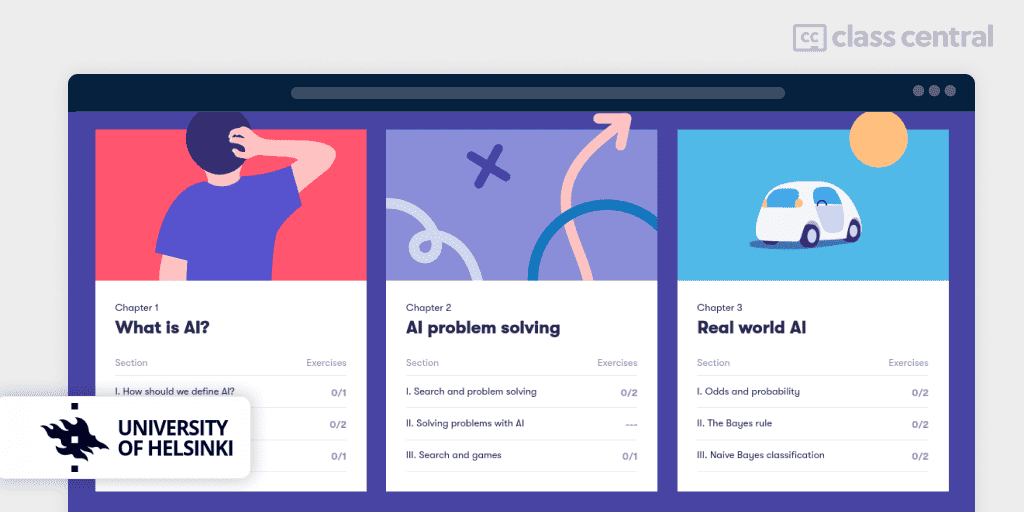
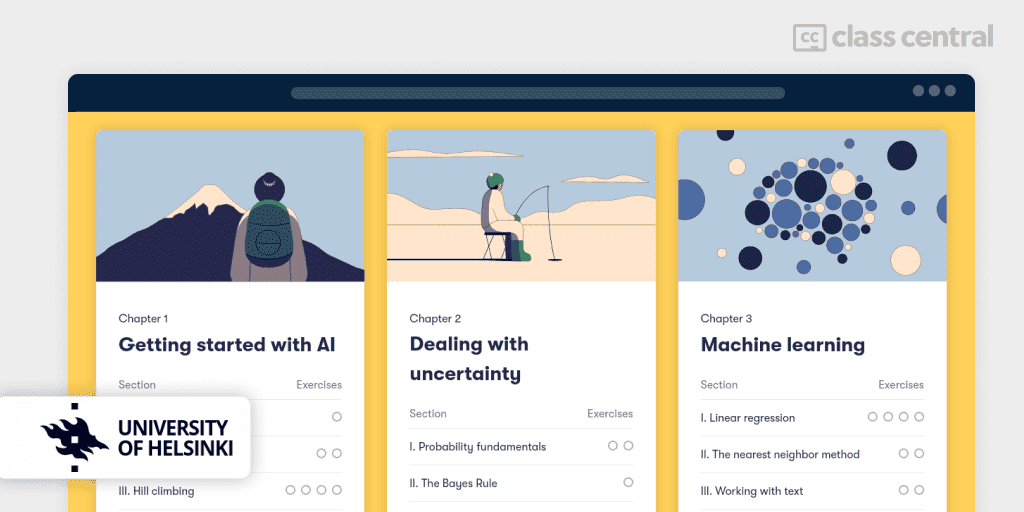


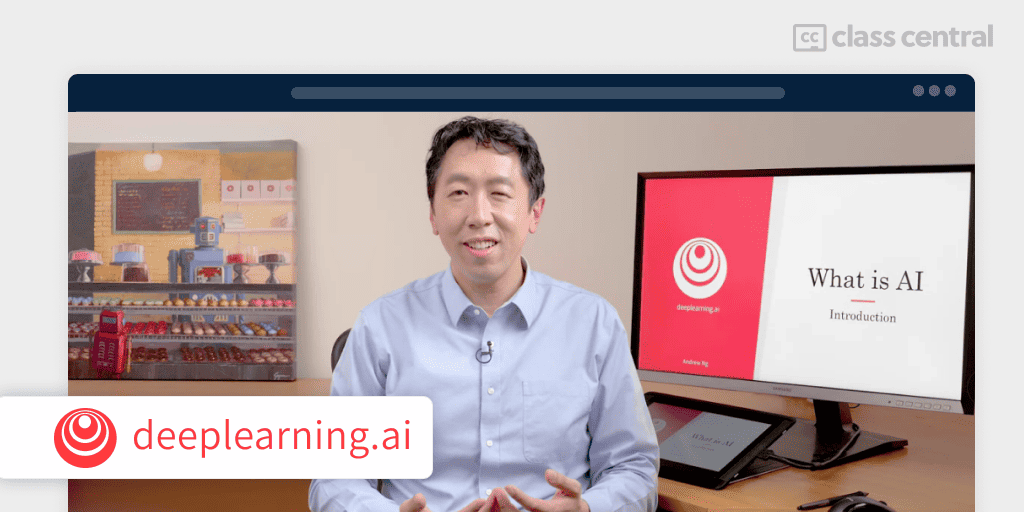
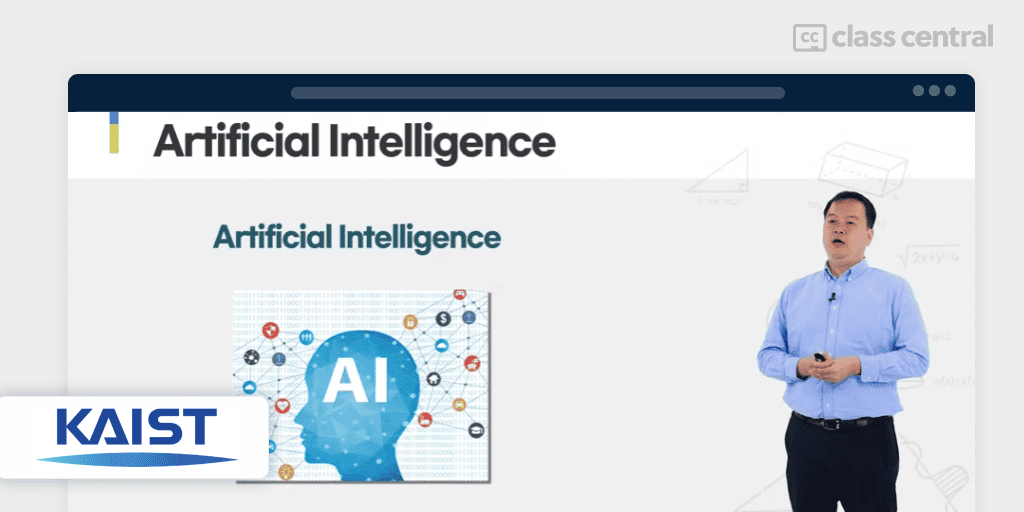

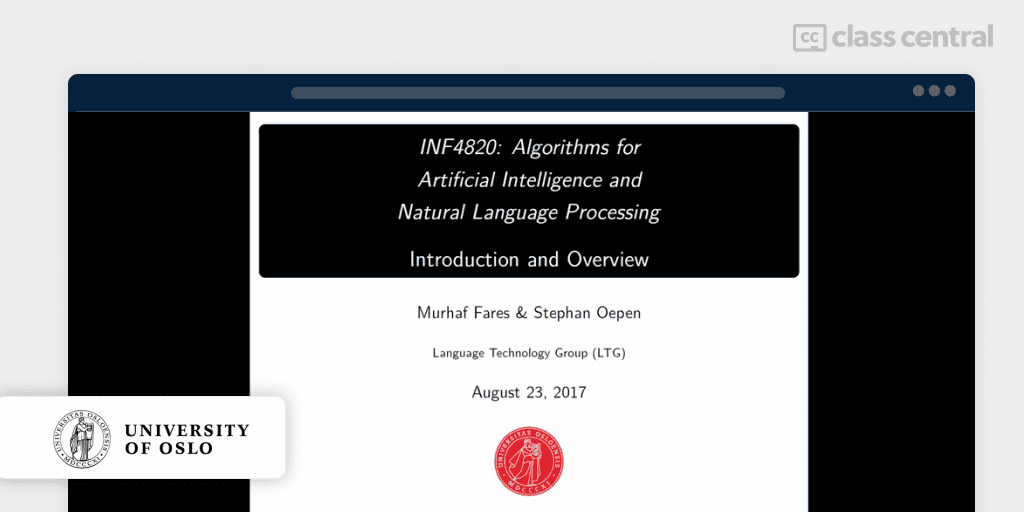
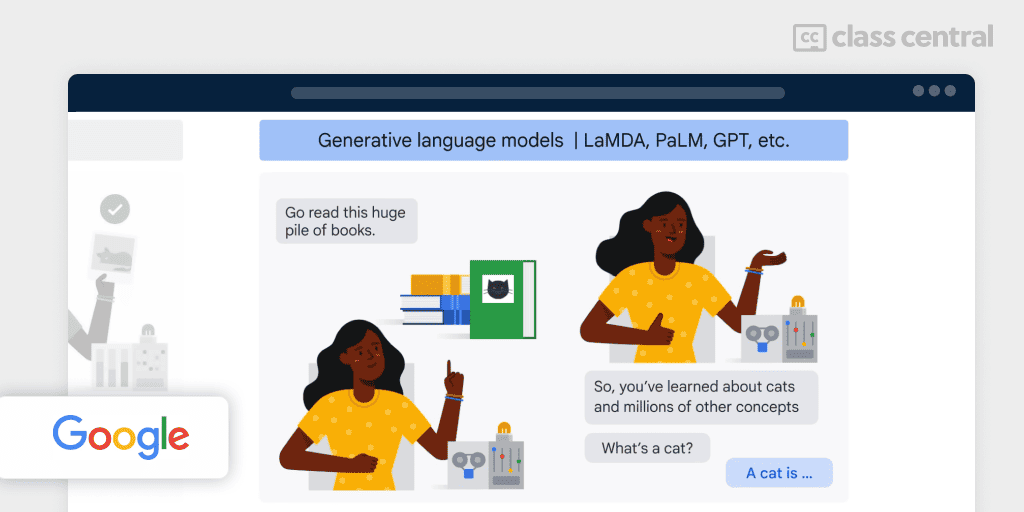








Madni Bhatti
Appreciate! the quality work done by you for a beginner aiming to start with AI
Ivandro Salvador dos Santos Zeferino
Gostaria de aprender muito sobre inteligência artificial, sou estudante de mestrado em engenharia informática, confesso que na licenciatura não aprendi nada sobre programação mas tenho me esforçado muito para não ficar de fora do mundo da tecnologia e portanto sei que com os vossos cursos aprenderei muito e em pouco tempo, muito obrigado e ansioso para começar o curso de iniciante
Monica
Nossa top demais!